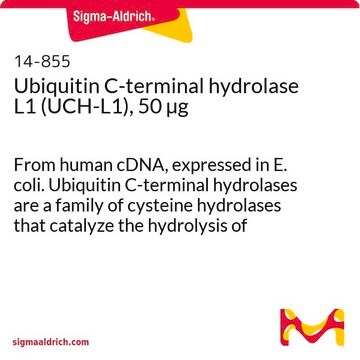03-0203-00
SMC® Human GFAP High Sensitivity Immunoassay Kit
Sinónimos:
GFAP Single Molecule Counting Kit, GFAP ultra-sensitive immunoassay, Glial fibrillary acidic protein immunoassay kit
About This Item
Productos recomendados
species reactivity
human
Quality Level
manufacturer/tradename
SMC®
assay range
sensitivity: 0.23 pg/mL
(Lower Limit of Quantification)
inter-assay cv: ≤6%
intra-assay cv: ≤5%
(Intra-assay CV n=5; Inter-assay n=3)
General description
Glial fibrillary acidic protein (GFAP) is a type III intermediate filament protein produced notably by astrocytes during CNS development, and functions in astrocyte regeneration, plasticity, and also contributes to function of the blood brain barrier. GFAP is a potential biomarker in a number of neurodegenerative diseases as well as in traumatic brain injury. There is much interest today in measuring GFAP levels in low abundance, because not only does it make it possible to evaluate this protein as a blood biomarker, but also enables researchers to study the downregulation of GFAP in therapeutic research. The new SMC® Human GFAP High Sensitivity Immunoassay Kit enables accurate measurement of this protein in human serum, plasma, and cerebrospinal fluid, harnessing the power of the SMCxPRO® ultrasensitive immunoassay system.
Specificity
Non Human Primate – 100%
Mouse – 100%
Rat – 100%
Canine – 100%
Feline – 100%
Note: This assay was tested for cross-reactivity with Ventimin, NFL, UCHL1 and total Tau. No cross-reactivity was detected with any of these analytes.
Application
This new streamline kit has the following features:
- Improved options for sample prep and incubation
- Lyophilization protein standard for uniform shipping and storage condition
- Increased reagent volumes to accommodate automation
- Able to achieve assay specifications on both SMCxPRO® and Erenna.
Research Category:
Neuroscience
neurological
Research Sub-Category:
Alzheimer′s Disease
Aging, Nervous System
Neurodegenerative Diseases
Neurofilament & Neuron Metabolism
Neuronal & Glial Markers
Neuroregenerative Medicine
Neuroscience
Components
- Assay Buffer
- GFAP Coated Beads
- Standard Diluent
- GFAP Detection Antibody
- GFAP Standard
- 10X Wash Buffer
- Buffer D
- Elution Buffer B
Specifications
Minimum of 4 plasma samples spiked with average recovery of 115% with a range of 110-119%
Minimum of 5 CSF samples spiked with average recovery of 101% with a range of 95-106%
Legal Information
Disclaimer
signalword
Danger
Hazard Classifications
Acute Tox. 3 Dermal - Acute Tox. 4 Inhalation - Acute Tox. 4 Oral - Aquatic Chronic 3 - Eye Irrit. 2 - Repr. 1B
Storage Class
6.1C - Combustible acute toxic Cat.3 / toxic compounds or compounds which causing chronic effects
wgk_germany
WGK 3
Certificados de análisis (COA)
Busque Certificados de análisis (COA) introduciendo el número de lote del producto. Los números de lote se encuentran en la etiqueta del producto después de las palabras «Lot» o «Batch»
¿Ya tiene este producto?
Encuentre la documentación para los productos que ha comprado recientemente en la Biblioteca de documentos.
Contenido relacionado
Aproveche la potencia de los inmunoanálisis de alta sensibilidad Single Molecule Counting (SMC®) en la investigación neurocientífica para una medición precisa de los analitos proteicos neurológicos clave en la salud y la enfermedad, utilizando la potente plataforma de detección SMCxPRO®. Analice biomarcadores neurocientíficos como NF-L, GFAP, proteína Tau, beta amiloide y más.
Aproveche la potencia de los inmunoanálisis de alta sensibilidad Single Molecule Counting (SMC®) en la investigación neurocientífica para una medición precisa de los analitos proteicos neurológicos clave en la salud y la enfermedad, utilizando la potente plataforma de detección SMCxPRO®. Analice biomarcadores neurocientíficos como NF-L, GFAP, proteína Tau, beta amiloide y más.
Aproveche la potencia de los inmunoanálisis de alta sensibilidad Single Molecule Counting (SMC®) en la investigación neurocientífica para una medición precisa de los analitos proteicos neurológicos clave en la salud y la enfermedad, utilizando la potente plataforma de detección SMCxPRO®. Analice biomarcadores neurocientíficos como NF-L, GFAP, proteína Tau, beta amiloide y más.
Neuroscience biomarker research expands with high-sensitivity immunoassays for low-abundant biomarkers.
Nuestro equipo de científicos tiene experiencia en todas las áreas de investigación: Ciencias de la vida, Ciencia de los materiales, Síntesis química, Cromatografía, Analítica y muchas otras.
Póngase en contacto con el Servicio técnico









